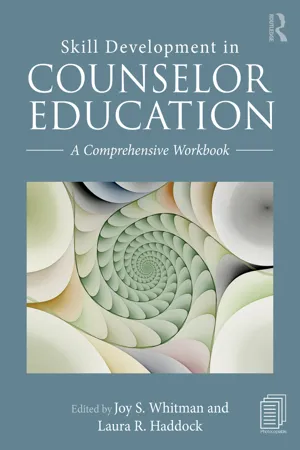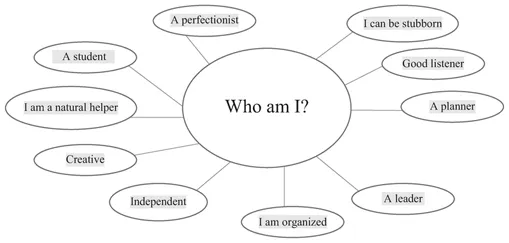
eBook - ePub
Skill Development in Counselor Education
A Comprehensive Workbook
- 164 pages
- English
- ePUB (mobile friendly)
- Available on iOS & Android
eBook - ePub
Skill Development in Counselor Education
A Comprehensive Workbook
About this book
Skill Development in Counselor Education provides counselor educators in training with a variety of materials and suggestions to assist in building fundamental skills. Templates, activities, and quizzes guide educators in developing their identities and teaching philosophies, developing engaging curricula, teaching cultural and technological competence, and dealing with complex ethical issues in the classroom. The book also covers a variety of practical topics related to seeking a faculty position or navigating an academic appointment, including writing a CV and cover letter, preparing for interviews, and navigating the tenure process.
Frequently asked questions
Yes, you can cancel anytime from the Subscription tab in your account settings on the Perlego website. Your subscription will stay active until the end of your current billing period. Learn how to cancel your subscription.
No, books cannot be downloaded as external files, such as PDFs, for use outside of Perlego. However, you can download books within the Perlego app for offline reading on mobile or tablet. Learn more here.
Perlego offers two plans: Essential and Complete
- Essential is ideal for learners and professionals who enjoy exploring a wide range of subjects. Access the Essential Library with 800,000+ trusted titles and best-sellers across business, personal growth, and the humanities. Includes unlimited reading time and Standard Read Aloud voice.
- Complete: Perfect for advanced learners and researchers needing full, unrestricted access. Unlock 1.4M+ books across hundreds of subjects, including academic and specialized titles. The Complete Plan also includes advanced features like Premium Read Aloud and Research Assistant.
We are an online textbook subscription service, where you can get access to an entire online library for less than the price of a single book per month. With over 1 million books across 1000+ topics, we’ve got you covered! Learn more here.
Look out for the read-aloud symbol on your next book to see if you can listen to it. The read-aloud tool reads text aloud for you, highlighting the text as it is being read. You can pause it, speed it up and slow it down. Learn more here.
Yes! You can use the Perlego app on both iOS or Android devices to read anytime, anywhere — even offline. Perfect for commutes or when you’re on the go.
Please note we cannot support devices running on iOS 13 and Android 7 or earlier. Learn more about using the app.
Please note we cannot support devices running on iOS 13 and Android 7 or earlier. Learn more about using the app.
Yes, you can access Skill Development in Counselor Education by Joy S. Whitman, Laura R. Haddock, Joy S. Whitman,Laura R. Haddock in PDF and/or ePUB format, as well as other popular books in Psychology & Mental Health in Psychology. We have over one million books available in our catalogue for you to explore.
Information
1 Establishing an Identity as a Counselor Educator
The supplemental materials in this chapter are included to assist building insight into the professional identity characteristics that produce, promote, and foster learning, and explore what qualities make for effective and influential teachers. They will include:
- Experiential exercises for self-awareness and to strengthen teaching
- Guided activity to explore personal characteristics that may foster and hinder effective teaching
- Questions to deepen your self-reflection about your identity as an educator in counselor education
- Quiz
Experiential Exercises for Self-Awareness and to Strengthen Teaching
Laura R. Haddock
In order to promote a connection between self-reflection and your teaching, begin by determining what you want to focus on. It may be that you would like to emphasize a particular element of your teaching process or examine student connection, or how to strengthen the delivery of course content. Whatever you choose, begin by collecting information.
Here are a few ways that you can do this:
Keep a Journal
A journal is an easy way to reflect upon what happens during your instruction. With consideration for the area you want to focus on, jot down a few notes describing your reactions and feelings to your own work and then, if helpful, follow up with any observations you have about your students.
Video Recording
A video recording of your teaching is valuable because it provides an unaltered and unbiased vantage point for how effective your lesson may be from both a teacher and student perspective. Record yourself teaching, watch the recording, and reflect on your observations.
Student Observation
Student feedback is frequently offered to faculty members at the end of each term. Think critically about the feedback. Take note of your reactions and reflect on what this information might mean to your teaching process.
Peer Observation
Invite a colleague to observe your teaching. Give your peer questions that you would like to have the answers to regarding your teaching such as whether the students seemed to be engaged or understand the material. Take some time to collaborate after the observation and hear your colleagues feedback and answers to your questions. Reflect on the information.
Analyze and Implement Effective Techniques
Now that you have collected the information, it’s time to analyze it. The first thing you should look for is any recurring patterns. If you video recorded your lesson, did you find anything that kept happening over and over? Look at your student feedback. Did any themes emerge?
Self-Reflection on Desirable Clinical and Teaching Skills
The ultimate goal of self-reflection is to strengthen the way you teach. Self-reflection is a technique that can help you increase your self-concept and maximize your potential as an instructor. Explore your skills by engaging in the following activity.
Take a piece of paper and label one side “Counselor” and the other side “Teacher”. Starting with counselor, make a list of skills that you feel serve you best in your clinical work. Make the list reflective of both interpersonal dynamics and clinical skill. For example, you might include characteristics like genuine, large vocabulary of feeling words, and knowledgeable about multiple counseling techniques and interventions. on your list of descriptions for a good counselor. Next, flip to the other side and using your own life experience and your current impressions, make a list of the interpersonal dynamics and teaching skills that you feel are necessary to be successful as a teacher. For example, you might include, competent in counseling theory and human growth and development, knowledgeable about learning theory, talented in generating individualized feedback. After you have completed both lists, consider which items seem to naturally transfer and/or are included on both lists. Next consider what skills you have identified as important for teaching that you still need to learn.
Guided Activity to Explore Personal Characteristics That May Foster and Hinder Effective Teaching
Sheila N. Russell
Think about a past teacher that you admired or favored. Create a visual concept map that identifies your personal characteristics. Then color in the bubbles yellow that you think are characteristics that foster effective teaching, and color in the bubbles red that you think hinder effective teaching. Make sure you consider things that inspire and motivate you, as well as personal biases that might hinder effective teaching. An example of a concept map is provided below.

Figure 1.1
Questions to Deepen Your Self-Reflection About Your Identity as an Educator in Counselor Education
Jenae Thompson and Joy S. Whitman
- What personal and professional experiences led you to becoming a counselor educator?
- How have these experienced shaped the way you teach or plan to teach counselors-in-training (CIT)? Provide examples.
- What personal characteristics, traits, and skills do you believe you have that will contribute to your identity as an educator? What will detract? What do you plan to do to enhance those characteristics, traits, and skills that will contribute and reduce those that will detract?
- How does your identity as a counselor influence your identity as an educator? What skills and knowledge as a counselor do you imagine transferring to your skill and knowledge base as a counselor educator?
- Beyond the knowledge and skills that students learn in counseling programs, what do you hope future counseling students gain from their experience with you as their educator? What professional characteristics as a counselor do you expect will influence your identity as a counselor educator and impact the experience students have with you?
Quiz
1. Which of the following is not considered part of the teaching role?
a. Classroom instruction
b. Supervision of practicum/internship students
c. Publishing or presenting original research
d. Mentoring doctoral students
2. Critical Thinking and problem solving are one of three critical components of:
a. Teaching
b. Service
c. Scholarship
d. None of the above
3. According to the Carnegie Classifications of Institutions of Higher Learning, Research I schools give high priority to:
a. Research
b. Teaching
c. Service
d. Teacher wellness
4. Counselor Educators are mandated to be skilled as clinicians and teachers by which of the following?
a. University Employment Contracts
b. ACA Code of Ethics
c. Doctoral degree requirements
d. Counselor Educator Oath of Responsibility
5. Who said the following: “If you can’t explain it simply, you don’t understand it well enough”?
a. Frank Parsons
b. Sam Gladding
c. Albert Einstein
d. Donald Trump
6. Which of the following are not mentioned as a reason that adults routinely return to graduate school?
a. Professional image
b. Higher wages
c. Increased career opportunities
d. Both A and C
7. Strong relational connections with students may result in:
a. Increased interest in the teacher’s professional experiences
b. More cooperative students
c. Better attendance
d. Having students submit work on time
8. Faculty members may expect to participate in professional service throughout their career in the areas of:
a. University Service
b. Service to the Profession
c. Service to the Community
d. One or all of these
9. Counselor Educat...
Table of contents
- Cover
- Title
- Copyright
- Contents
- List of Contributors
- Preface
- Acknowledgments
- 1 Establishing an Identity as a Counselor Educator
- 2 Developing a Personal Philosophy of Teaching
- 3 Ethical and Legal Issues for Counselor Educators
- 4 Multicultural and Social Justice Leadership and Learning in the Classroom
- 5 Classroom Engagement and Evidence-Based Teaching Strategies with Adult Learners
- 6 Acquisition of Knowledge and Skills
- 7 Curriculum Development
- 8 Evaluation of Student Learning: Instructor Feedback and Developmental Assessment
- 9 The Role of Gatekeeping in Counselor Education
- 10 Teaching Across Settings
- 11 The Role of Mentoring in Counselor Education
- 12 You Have Learned to Be a Teacher, What Is Next?
- Answer Key to Quizzes
- Index